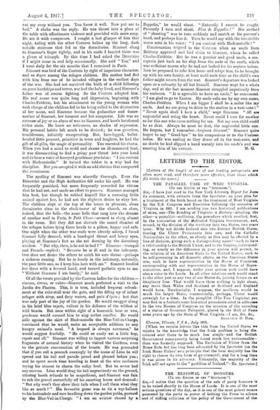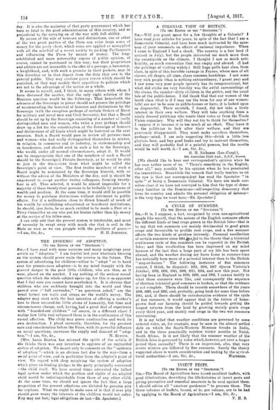THE BESTOWAL OF HONOURS.
Its me Emma or ens SPECT.06."1
S,,—I notice that the question of the sale of party honours is to be raised shortly in the House of Lords. It is one of the moat serious questions of the day, as It is one of the most potent means possessed by the party in power of bribing the Press to silence and of sliding criticism of the policy of the Government of the
day. It is also the mainstay of that party government which has been so fatal to the good administration of this country, and so prejudicial to the carrying on of the war with full ability.
By means of the sale of hone-are and distinctions, one or other of the two great parties of the State can raise large sums of money for the party chest, which sums are applied or misapplied with all the mischief of a secret society to packing Parliaments and influencing the l'ress by means of money. The long- established and more noteworthy organs of public opinion, of course, cannot be purchased in this way; but their proprietors and editors are not insensible to the offer of a peerage, a baronetcy, a.- knighthood, and, with such a promise in their pockets, may in this direction or in that depart from the duty they owe to the general public. They may condone grave errors which should be punished, or they may modify their opposition to policies which are not to the advantage of the nation as a whole.
It seems to myself, and, I think, to many others with whom I have discussed the matter, thot the only right solution of the Honours question would be the following: That henceforth the advisers of the Sovereign in power should not possess the privilege of recommending the bestowal of honours and distinctions by the Sovereign (with the exception perhaps of certain Orders of Merit for military and naval men and Civil Servants), but that a Board should be set up by the Sovereign consisting of a number of justly distinguished men and women, who twice a year perhaps should draw up a list for the consideration of the Sovereign of honours and distinctions of all kinds which might be bestowed on the next occasion. Such a Board would pass in review all persons—men and women—who had really distinguished themselves in science, fa religion, in commerce and in industry, in statesmanship and in beneficence, and should send in such a list to the Sovereign, who would, under all normal circumstances, adopt it. It would sot be inappropriate that one of the members of such a Beard should be the Sovereign's Private Secretary, as he would be able to join in the discussions from what might be called the Severeign'e point of view. The first twelve members of sofa a Board might be nominated by the Sovereign himself, with or without the advice of the Ministers of the day, and it should be empowered to co-opt another twelve colleagues, forming twenty- four in all. Thus selected, it would be almost impossible for a majority of these twenty-four persons to be bribable by persons of wealth and position. At the same time, it would still be possible for money to purchase distinctions without detriment to public affairs. For if a millionaire chose to divest himself of much of his wealth by establishing educational or beneficent institutions, he should, ipso facto, be as much entitled to be made a Peer or a Privy Councillor as one who put his brains rather than his money at the service of his fellow-men.
I can only add that the present system is intolerable, and must of necessity be swept away with much else that is evil in the State as soon as we can grapple with the problems of peace.—



























 Previous page
Previous page